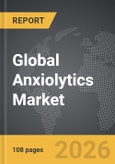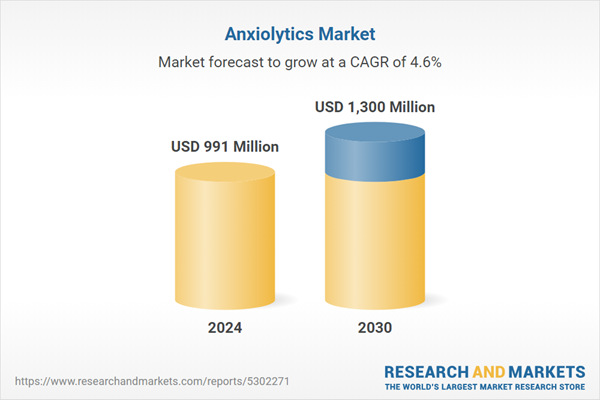Global Anxiolytics Market - Key Trends and Drivers Summarized
Why Are Anxiolytics So Crucial in Modern Medicine?
Anxiolytics, commonly referred to as anti-anxiety medications, are a class of psychotropic drugs designed to alleviate symptoms of anxiety, stress, and related disorders by modulating the chemical balance within the brain. The primary mechanism through which anxiolytics work involves influencing neurotransmitters like gamma-aminobutyric acid (GABA), serotonin, and norepinephrine, which play a critical role in regulating mood, stress responses, and overall mental stability. GABA, in particular, is a key inhibitory neurotransmitter that helps reduce neuronal excitability. Anxiolytics such as benzodiazepines - like diazepam and lorazepam - enhance the effect of GABA, thereby inducing a calming effect, reducing excessive brain activity, and providing rapid relief from acute anxiety episodes. Other classes of anxiolytics, such as selective serotonin reuptake inhibitors (SSRIs) and serotonin-norepinephrine reuptake inhibitors (SNRIs), work by increasing the availability of serotonin or norepinephrine in the brain, which helps stabilize mood and alleviate anxiety over a more extended period. Additionally, newer classes like beta-blockers can be used off-label to manage physical symptoms of anxiety, such as rapid heartbeat and tremors. The pharmacodynamics of each anxiolytic class varies, making them suitable for different types of anxiety disorders, including generalized anxiety disorder (GAD), panic disorder, social anxiety disorder, and post-traumatic stress disorder (PTSD). Understanding these nuanced mechanisms is crucial, as the efficacy and safety profiles of these drugs depend significantly on the nature and severity of the anxiety, patient history, and the presence of co-occurring mental health conditions.Why Are Anxiolytics Increasingly Prescribed Across Various Populations?
The widespread use of anxiolytics is a reflection of the growing prevalence of anxiety disorders and the increasing recognition of mental health issues as critical components of overall health. According to recent statistics from global health organizations, anxiety disorders affect more than 260 million people worldwide, making them one of the most common mental health conditions. This trend has prompted healthcare professionals to incorporate anxiolytics into treatment regimens more frequently, not only for managing chronic anxiety but also for addressing acute stress reactions and co-morbid conditions such as depression and insomnia. The demographic of individuals prescribed anxiolytics is also expanding beyond typical high-stress groups like working adults to include adolescents, older adults, and even children in some cases. For example, the pressures associated with academic performance, social expectations, and the rise of digital stressors have contributed to an increase in anxiety diagnoses among younger populations, leading to greater reliance on SSRIs and SNRIs for longer-term management. On the other end of the age spectrum, elderly patients are increasingly being prescribed anxiolytics to manage anxiety stemming from health concerns, social isolation, or cognitive decline. This broadening demographic is also partly driven by the shifting societal perspective that views mental health treatment as a necessity rather than a stigma. Furthermore, anxiolytics are often prescribed as adjuncts to psychotherapy, enabling patients to engage more effectively in cognitive behavioral therapy (CBT) or other therapeutic interventions by reducing the intensity of anxiety symptoms.What Are the Recent Advances in Anxiolytic Medications?
Recent developments in anxiolytic pharmacotherapy are focused on enhancing safety, reducing side effects, and addressing the unmet needs in anxiety treatment. A significant innovation is the development of non-benzodiazepine anxiolytics, which aim to provide effective anxiety relief without the sedative and dependency issues associated with traditional benzodiazepines. Drugs like buspirone, which acts as a serotonin receptor agonist, offer a non-sedating alternative for patients with generalized anxiety disorder (GAD) and have a lower risk of abuse. Another advancement is the growing exploration of neurosteroids and glutamate receptor modulators, which target different neurotransmitter systems than conventional anxiolytics. For instance, drugs like brexanolone, a neuroactive steroid, modulate GABA receptors in a unique way, offering new therapeutic avenues for treatment-resistant anxiety and conditions such as postpartum anxiety. Additionally, research is increasingly focused on medications that can address anxiety's cognitive aspects, like rumination and excessive worry, rather than just its somatic symptoms. The introduction of partial serotonin agonists and drugs that influence cannabinoid receptors are also generating interest, as they promise to fine-tune anxiety management without disrupting the broader neurochemical balance. Beyond pharmacological innovations, there is a trend towards personalized medicine, where genetic profiling and biomarkers are used to predict individual responses to anxiolytics, thereby improving treatment outcomes and minimizing side effects. This personalized approach is being complemented by the use of digital therapeutics, where anxiolytics are combined with smartphone-based applications or virtual reality tools that provide real-time monitoring and support, making anxiety management more holistic and patient-centric.What's Driving the Growth of the Anxiolytic Market?
The growth in the anxiolytic market is driven by several factors, including the rising prevalence of anxiety disorders, greater awareness and acceptance of mental health treatment, and the increasing availability of novel therapeutic options. One of the primary growth drivers is the global rise in anxiety and stress-related conditions, which has been exacerbated by factors such as socio-economic instability, workplace stress, and more recently, the impact of the COVID-19 pandemic. The pandemic has particularly highlighted the need for effective anxiety management, as millions of people have experienced increased stress, isolation, and uncertainty, leading to a surge in demand for both prescription and over-the-counter anxiolytics. In addition, the growing emphasis on mental health by governments and healthcare institutions has led to expanded access to psychiatric care, which includes a broader use of anxiolytics as first-line or adjunct treatments. The development of next-generation anxiolytics with improved safety profiles is also fueling market growth, as these newer medications offer alternatives for patients who are unable to tolerate or are at risk of adverse effects from traditional benzodiazepines. Moreover, the expansion of telemedicine and digital health services has made psychiatric consultations and medication management more accessible, particularly in underserved or remote areas, thereby increasing the overall market reach. Changing consumer attitudes towards mental health treatment are another key factor, as the stigma associated with anxiety disorders diminishes and more people are willing to seek help. Furthermore, the growing trend of polypharmacy in treating complex co-morbid conditions - where anxiolytics are used alongside antidepressants, antipsychotics, or mood stabilizers - has also contributed to rising prescription rates. Lastly, advancements in drug delivery methods, such as extended-release formulations and novel oral dispersible tablets, are enhancing patient adherence and expanding the use of anxiolytics in non-traditional settings, thus creating new growth opportunities for pharmaceutical companies in this sector.Report Scope
The report analyzes the Anxiolytics market, presented in terms of market value (US$ Thousand). The analysis covers the key segments and geographic regions outlined below.- Segments: Segment (Anxiolytics).
- Geographic Regions/Countries:World; United States; Canada; Japan; China; Europe (France; Germany; Italy; United Kingdom; Spain; Russia; and Rest of Europe); Asia-Pacific (Australia; India; South Korea; and Rest of Asia-Pacific); Latin America (Argentina; Brazil; Mexico; and Rest of Latin America); Middle East (Iran; Israel; Saudi Arabia; United Arab Emirates; and Rest of Middle East); and Africa.
Regional Analysis
Gain insights into the U.S. market, valued at $259.8 Million in 2024, and China, forecasted to grow at an impressive 7.1% CAGR to reach $283.3 Million by 2030. Discover growth trends in other key regions, including Japan, Canada, Germany, and the Asia-Pacific.Why You Should Buy This Report:
- Detailed Market Analysis: Access a thorough analysis of the Global Anxiolytics Market, covering all major geographic regions and market segments.
- Competitive Insights: Get an overview of the competitive landscape, including the market presence of major players across different geographies.
- Future Trends and Drivers: Understand the key trends and drivers shaping the future of the Global Anxiolytics Market.
- Actionable Insights: Benefit from actionable insights that can help you identify new revenue opportunities and make strategic business decisions.
Key Questions Answered:
- How is the Global Anxiolytics Market expected to evolve by 2030?
- What are the main drivers and restraints affecting the market?
- Which market segments will grow the most over the forecast period?
- How will market shares for different regions and segments change by 2030?
- Who are the leading players in the market, and what are their prospects?
Report Features:
- Comprehensive Market Data: Independent analysis of annual sales and market forecasts in US$ Million from 2024 to 2030.
- In-Depth Regional Analysis: Detailed insights into key markets, including the U.S., China, Japan, Canada, Europe, Asia-Pacific, Latin America, Middle East, and Africa.
- Company Profiles: Coverage of players such as Allergan, AstraZeneca, Bristol-Myers Squibb, Dr. Reddy's Laboratories Ltd., Endo International plc and more.
- Complimentary Updates: Receive free report updates for one year to keep you informed of the latest market developments.
Some of the 12 companies featured in this Anxiolytics market report include:
- Allergan
- AstraZeneca
- Bristol-Myers Squibb
- Dr. Reddy's Laboratories Ltd.
- Endo International plc
- GlaxoSmithKline
- Johnson and Johnson
- Mylan N.V.
- Novartis
- Pfizer
- Sun Pharmaceutical Industries Ltd.
- Teva Pharmaceutical Industries Ltd.
This edition integrates the latest global trade and economic shifts into comprehensive market analysis. Key updates include:
- Tariff and Trade Impact: Insights into global tariff negotiations across 180+ countries, with analysis of supply chain turbulence, sourcing disruptions, and geographic realignment. Special focus on 2025 as a pivotal year for trade tensions, including updated perspectives on the Trump-era tariffs.
- Adjusted Forecasts and Analytics: Revised global and regional market forecasts through 2030, incorporating tariff effects, economic uncertainty, and structural changes in globalization. Includes historical analysis from 2015 to 2023.
- Strategic Market Dynamics: Evaluation of revised market prospects, regional outlooks, and key economic indicators such as population and urbanization trends.
- Innovation & Technology Trends: Latest developments in product and process innovation, emerging technologies, and key industry drivers shaping the competitive landscape.
- Competitive Intelligence: Updated global market share estimates for 2025, competitive positioning of major players (Strong/Active/Niche/Trivial), and refined focus on leading global brands and core players.
- Expert Insight & Commentary: Strategic analysis from economists, trade experts, and domain specialists to contextualize market shifts and identify emerging opportunities.
Table of Contents
Companies Mentioned (Partial List)
A selection of companies mentioned in this report includes, but is not limited to:
- Allergan
- AstraZeneca
- Bristol-Myers Squibb
- Dr. Reddy's Laboratories Ltd.
- Endo International plc
- GlaxoSmithKline
- Johnson and Johnson
- Mylan N.V.
- Novartis
- Pfizer
- Sun Pharmaceutical Industries Ltd.
- Teva Pharmaceutical Industries Ltd.
Table Information
| Report Attribute | Details |
|---|---|
| No. of Pages | 108 |
| Published | February 2026 |
| Forecast Period | 2024 - 2030 |
| Estimated Market Value ( USD | $ 991 Million |
| Forecasted Market Value ( USD | $ 1300 Million |
| Compound Annual Growth Rate | 4.6% |
| Regions Covered | Global |









